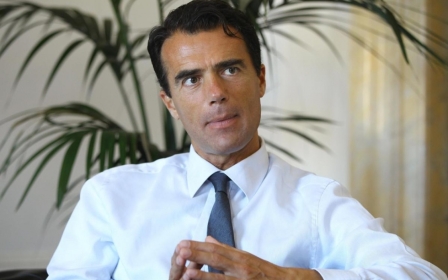Turkey and the Israel problem

Turkey-Israel relations have ‘normalised’ during the AK Party administration and continue to normalise without interruption. I realise the first sentence appears peculiar at first, but what I meant by that is this - contrary to common belief, the normalising of Turkey-Israel relations since the establishment of Israel in the 19th century has been strained by default. The short periods of time when Turkey-Israel relations seemed to be ameliorating were atypical. The historical scene invoked in popular culture when Israel is mentioned is the disagreement between the Zionists and Abdul Hamid II, the third to last of the Ottoman Sultans.
It was 19 June, 1896. Theodor Herzl, the father of political Zionism, had just offered an attractive package to Sultan Abdul Hamid II, via his messenger Philip Michael Nevlenski in exchange for his consent to establish the new Jewish state in Palestine. The offer was going to be renewed several times via various messengers between the years of 1896 and 1902. Nevlenski reported to Herzl the next day that the Sultan would not hear of the plan. He had responded:
If Mr. Herzl is as much your friend as you are mine, then advise him not to take another step in this matter. I cannot sell even a foot of land, for it does not belong to me, but to my people. My people have won this empire by fighting for it with their blood and have fertilised it with their blood. We will again cover it with our blood before we allow it to be wrested away from us. The men of two of my regiments from Syria and Palestine let themselves be killed one by one at Plevna. Not one of them yielded; they all gave their lives on that battlefield. The Turkish Empire belongs not to me, but to the Turkish people. I cannot give away any part of it. Let the Jews save their billions. When my Empire is partitioned, they may get Palestine for nothing. But only our corpse will be divided. I will not agree to vivisection (Herzl, 1960, p. 378 June 19, 1896, The complete diaries of Theodor Herzl. New York: Herzl Press and T. Yoseloff).
From this perspective, the most “atypical period” of Turkey-Israel relations was the period that immediately followed the ousting of the Erbakan administration by the military on 28 February 28, 1997. After 1997, the Kemalist tutelage regime followed a policy to maintain “strategic relations” with Israel. This policy was followed until Erdogan took office in 2002. The first signs of deterioration in this phase of strategic relations had actually come when the then Prime Minister Ecevit, from the Democratic Left Party (DSP), called Israel’s massacre in the Jenin governorate a genocide.
In recent years, Turkey not only objected to the plans of the American neocons to keep Syria under pressure during the Iraqi occupation, it began to take steps that altered Israel centred approaches to the Middle East. Turkey, having angered the neocons by not becoming an accomplice to the occupation of Iraq, proved its intention to follow a different policy by normalising its relations with Syria. When Turkey invited Khaled Mashaal to Turkey, in 2006, in a clear display of its intention to carry out diplomatic relations with the elected Hamas government, Turkey-Israel relations shifted to another level.
Israel, having interpreted Turkey’s intention accurately, retreated from Lebanon despite its association with Hamas. Immediately after the retreat, it initiated the talks to resolve its problems with Syria by way of Turkey and made great progress during 2007-2008. Just when an agreement was about to be reached between Israel and Syria, Olmert, without any forewarning, ordered an incursion into the Gaza strip. After this attack, Turkey-Israel relations never stood a chance.
A year later, yet another chapter in Turkey-Israel relations began when Erdogan strongly criticised the Israeli president and left the stage during a live broadcast in Davos. The strained relations were completely severed when Israel attacked the humanitarian aid flotilla Mavi Marmara causing the death of ten Turkish relief workers. The tensions continued until 2013 when Israel, with Obama’s intervention, apologised for the first time in its history. Turkey had put three conditions before it would agree to resume diplomatic relations: an official apology from Turkey, reparations for the families of the relief workers, and the dissolution of sanctions on Gaza.
After the 2014 attacks on Gaza, last week, Erdogan made this comment:
Right now, 400 thousand tons of Israeli bombs are raining on Gaza. The death toll has already reached 120 in Palestine along with 700 wounded. Israel continues on its path of hatred. We had cut all of our ties with Israel after Mavi Marmara. Other countries intervened and Israel apologised. They met the first two conditions. We had a third condition, in addition to reparations. It appeared that Israel had the intention to lift the embargo, but then these attacks began. Israel, you need to stop these atrocities. If not, it is not possible to normalise the ties between Israel and Turkey. I am not talking about words without action. You expect normalisation of relations, but you did not hold your end of the bargain. This means that you were not sincere. All steps we have taken towards normalisation of relations with Israel have now been locked in a box.
The atypical period of Turkey-Israel relations is limited to the short period after the 1997 coup. Let’s take a look at history through the work of Middle East analyst Ufuk Ulutas’ latest piece.
29 November, 1947: The General Assembly votes 33-13 in favour the resolution to partition Palestine. Turkey voiced its objection again by voting against the plan.
26 November, 1956: The Suez crisis begins. Turkey makes its position clear by lowering diplomatic ties with Israel to a bare minimum.
June 1967: Turkey takes a clear stance against Israel by joining the Arab countries in condemning the Six Day war and Israel’s increasing penetration. It is the Turkish Consul who stops the Israeli soldiers from impaling the Israeli flag on the Dome of the Rock (Qubbat As-Sakhrah) in east Jerusalem.
30 November, 1980: Turkey closes its consulate in Jerusalem after Israel declares it as capital, once again clearly taking Palestine’s side.
These snippets show that the history of Turkey-Israel relations is riddled with tension. Turkey’s current reaction to Israel is a continuation of its stance against Israel. It is clear that Israel intends to take advantage of the lull that settled over the Middle East in the aftermath of the revolutions in order to deepen its invasion.
Turkey, for the last six years, in addition to providing humanitarian aid to Gaza and openly supporting Hamas, serves another important function. By standing against Israel’s occupation, its nuclear arms, illegal settlements and the sanctions on Gaza, Turkey calls attention to the critical issue of the “Israel problem” that no one, including Obama, wants to touch.
Israel hopes Erdogan will give up at some point. However, even if he does give up, it is not possible for a country with the history summarised above to have any other kind of reaction to Israel.
- Taha Ozhan is the president of SETA Foundation at Ankara. He is an academic, writer and columnist for Star Daily and Daily Sabah. He appears on weekly political debate show on national TV. He frequently comments and writes for international media. His latest book, Normalization Pains (2014), was about Kurdish issue.
The views expressed in this article belong to the author and do not necessarily reflect the editorial policy of Middle East Eye.
Photo: Turkey's Prime Minister Recep Tayyip Erdogan (L) shakes hands with Hamas leader Khaled Meshaal during their meeting in Ankara on 16 March, 2012 (AFP)
Stay informed with MEE's newsletters
Sign up to get the latest alerts, insights and analysis, starting with Turkey Unpacked
Middle East Eye delivers independent and unrivalled coverage and analysis of the Middle East, North Africa and beyond. To learn more about republishing this content and the associated fees, please fill out this form. More about MEE can be found here.





